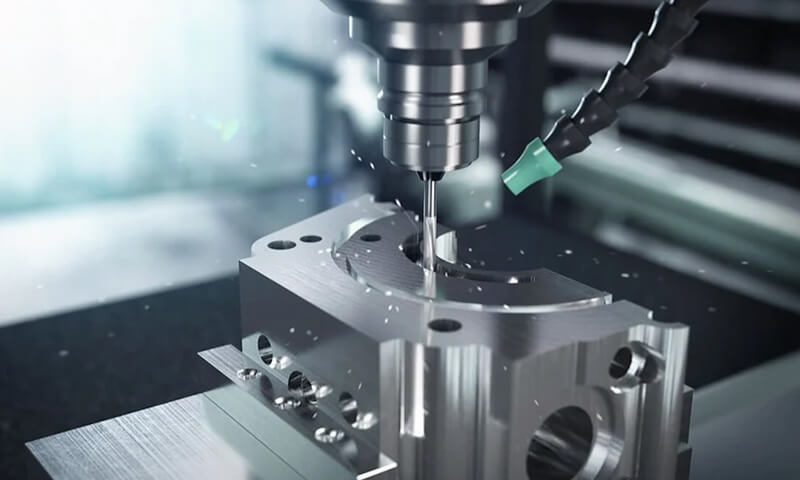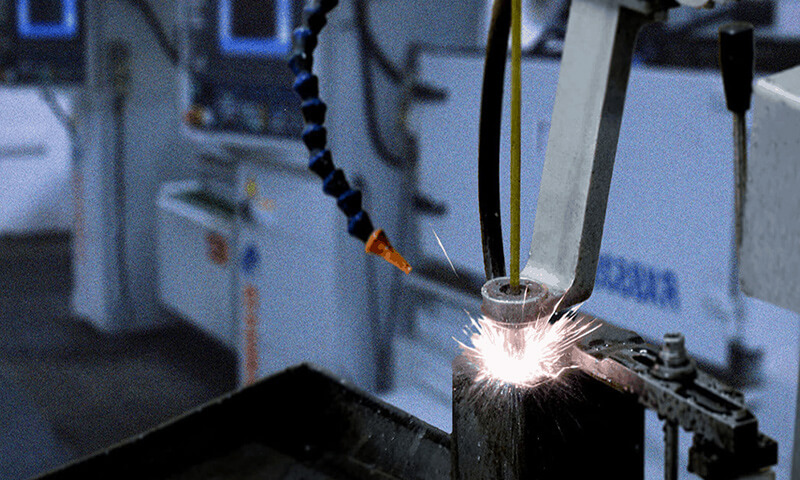1. Úvod do nerezové oceli CF8M
Nerezová ocel CF8M, také známý jako Typ 316, je široce používaná třída nerez který nabízí výjimečnou odolnost proti korozi, pevnost, a trvanlivost.
Hraje klíčovou roli v slévárenském a zpracovatelském průmyslu, kde je vysoce ceněna jeho schopnost odolat drsnému prostředí a zachovat si integritu v průběhu času.
Tento blogový příspěvek se ponoří do vlastností, Aplikace, a výhody CF8M, poskytuje cenné poznatky pro inženýry, návrháři, a výrobci.
2. Co je nerezová ocel CF8M?
Definice a složení
- Chemické složení: CF8M obsahuje přibližně 16-18% Chromium, 10-14% nikl, a 2-3% molybden.
Přídavek molybdenu výrazně zvyšuje jeho odolnost proti důlkové a štěrbinové korozi, zejména v prostředích obsahujících chloridy. - ASTM Specifikace A743/A744: Tyto specifikace popisují požadavky na odlitky vyrobené z CF8M, včetně chemického složení, Mechanické vlastnosti, a testovací metody.
Například, minimální pevnost v tahu požadovaná těmito normami je 75,000 psi (517 MPA).

Podobné specifikace
- Obsadit nás: J92900
Toto je jednotný systém číslování (NÁS) označení pro odlévání nerezové oceli CF8M. - Teakets uns: S31600
Tvářeným ekvivalentem CF8M je UNS S31600, který je běžně označován jako 316 nerez.
Sdílí podobné antikorozní vlastnosti, zejména díky zahrnutí molybdenu. - Tepelná třída: 316
Nerez 316 je kovaný ekvivalent CF8M, poskytující podobné chemické složení a vlastnosti. - Hlavní třída: CF8M
To se týká specifického označení lití slitiny, běžně používané v průmyslových odvětvích vyžadujících vysokou odolnost proti korozi. - Specifikace Cast ASTM: A351, A743, A744
Tyto normy ASTM upravují vlastnosti a kvalitu litého CF8M. ASTM A351 pokrývá chemické a mechanické vlastnosti lité nerezové oceli pro díly obsahující tlak.
ASTM A743 a A744 definují specifikace pro odlitky používané v aplikacích odolných proti korozi. - Vojenství/AMS: AMS 5361
AMS 5361 specifikace se týká požadavků na materiál ve vojenském a leteckém průmyslu, zajištění shody s přísnými normami pro odolnost proti korozi a pevnost.
3. Vlastnosti nerezové oceli CF8M
Mechanické vlastnosti:
- Pevnost v tahu: Obvykle, CF8M vykazuje pevnost v tahu minimálně 485 MPA, nabízí vysokou odolnost proti deformaci při namáhání.
- Výnosová síla: S mezí kluzu kolem 175 MPA, CF8M odolává značným silám, než se začne plasticky deformovat.
- Tvrdost: Tvrdost CF8M obecně spadá mezi 150-190 HB, poskytuje rovnováhu mezi pevností a zpracovatelností.
- Prodloužení: Materiál vykazuje tažnost cca 30%, přispívá k její tažnosti a činí ji vhodnou pro tvářecí a obráběcí procesy.
Fyzikální vlastnosti:
- Hustota: 7.98 g/cm³, zajištění značné hmotnosti na jednotku objemu, což je rozhodující pro silové aplikace.
- Tepelná vodivost: 16.2 W/m-K, umožňující efektivní přenos tepla, i když nižší než uhlíková ocel, což je výhodné v prostředí s vysokou teplotou.
- Koeficient tepelné roztažnosti: 16.5 x 10⁻⁶/K, což naznačuje mírné tempo expanze, což je životně důležité v aplikacích, kde dochází ke kolísání teploty.
Odolnost proti korozi:
Jednou z nejvýraznějších vlastností CF8M je jeho vynikající odolnost proti korozi, zejména v chloridovém prostředí.
Díky tomu je vysoce účinný v námořních aplikacích, Chemické zpracování, a prostředí, kde by jiné materiály trpěly důlkovou nebo štěrbinovou korozí.
Teplotní odolnost:
CF8M funguje výjimečně dobře při vysokých i nízkých teplotách, zachování svých mechanických vlastností i v extrémních podmínkách.
Odolává oxidaci a usazování vodního kamene při zvýšených teplotách, zajišťující dlouhou životnost v náročných tepelných prostředích.
Svařovatelnost a formovatelnost:
Snadné svařování a tvarování slitiny je hlavní výhodou při výrobě. CF8M nevyžaduje tepelné zpracování po svařování, čímž je všestrannější a snižuje výrobní náklady.
Jeho tvarovatelnost umožňuje řadu výrobních technik, od lití po kování, díky tomu je přizpůsobitelný pro složité návrhy součástí.
4. Techniky odlévání pro CF8M
Přehled procesů odlévání
- Investiční obsazení: Ideální pro složité a detailní díly s úzkými tolerancemi. Tento proces zahrnuje vytvoření voskového vzoru, potažením keramikou, a poté roztavením vosku vytvořte formu.
- Lití písku: Vhodné pro větší a méně složité komponenty. Při lití do písku se používá písková forma k tvarování roztaveného kovu, který ztuhne a vytvoří finální část.

Důležité aspekty při odlévání CF8M
- Teploty tání a lití: Přesné ovládání je nezbytné, aby se předešlo závadám. Typická teplota lití pro CF8M se pohybuje od 2 800 °F do 2 900 °F (1,538°C až 1 593 °C).
- Rychlosti chlazení a tuhnutí: Řízené rychlosti chlazení zabraňují tepelnému namáhání a zajišťují jednotnou mikrostrukturu. Rychlé ochlazení může vést k vnitřnímu pnutí a potenciálnímu praskání.
- Materiály forem a jádra: Vysoce kvalitní materiály, jako je křemičitý písek a zirkon, jsou rozhodující pro dosažení požadované povrchové úpravy a rozměrové přesnosti.
- Post-casting procesy: Po obsazení, tepelné úpravy jako žíhání nebo kalení může zjemnit mikrostrukturu materiálu, zlepšit houževnatost, a zmírnit vnitřní napětí.
CNC obrábění může být také vyžadováno dosažení konečného tvaru a rozměrů.
5. Výhody použití CF8M v odlitcích
- Vynikající odolnost proti korozi: Odolnost CF8M vůči korozi v mořské vodě, kyseliny, a chloridy je ideální pro námořní a chemický průmysl.
Jeho obsah molybdenu výrazně snižuje riziko důlkové a štěrbinové koroze, zejména v drsném prostředí. - Vysoká síla a trvanlivost: S vysokou pevností v tahu a kluzu, Komponenty CF8M vykazují vynikající nosnost, zajišťuje delší životnost i při mechanickém namáhání.
- Vynikající svařitelnost a obrobitelnost: Schopnost CF8M snadno svařovat a obrábět bez nutnosti rozsáhlého následného zpracování zjednodušuje výrobu a snižuje výrobní náklady.
- Nákladová efektivita: Navzdory tomu, že se jedná o vysoce výkonný materiál, CF8M zůstává nákladově efektivním řešením, zejména pro aplikace vyžadující trvanlivost a odolnost vůči agresivnímu prostředí.
- Všestrannost: CF8M je vhodný pro širokou škálu průmyslových odvětví, od námořního inženýrství po zpracování potravin.
Jeho široká použitelnost z něj činí oblíbený materiál pro výrobce, kteří hledají flexibilitu a výkon.
6. Aplikace nerezové oceli CF8M
Námořní průmysl:
CF8M je široce používán v mořském prostředí díky své výjimečné odolnosti vůči korozi mořské vody.
Aplikace zahrnují vrtule, ventily, čerpadla, a armatury na lodích a pobřežních plošinách.
Chemické zpracování:
Slitina je oblíbenou volbou v chemických závodech, kde je běžné vystavení korozivním látkám.
CF8M se používá pro reaktory, skladovací nádrže, a potrubní systémy, které zvládají agresivní chemikálie.
Průmysl potravin a nápojů:
Hygiena je při výrobě potravin zásadní, a CF8M je nereaktivní, povrch odolný proti korozi je ideální pro komponenty, jako jsou mixéry, dopravníky, a skladovací nádrže v potravinářských provozech.
Farmaceutický průmysl:
CF8M se používá v zařízeních vyžadujících sterilní podmínky a odolnost proti korozi, jako jsou farmaceutické mixéry, reaktory, a potrubní systémy.
Ropný a plynárenský průmysl:
Svou odolností v korozivním prostředí, CF8M je široce používán v ropném a plynárenském průmyslu pro aplikace, jako jsou potrubí, ventily, a další podmořské složky.

Lékařské vybavení:
CF8M se také nachází v lékařských zařízeních a vybavení, poskytuje odolnost proti korozi a snadnou sterilizaci.
7. Kontrola kvality a testování odlitků CF8M
Význam přísné kontroly kvality
- Zajištění vlastností materiálu: Konzistentní kvalita je zásadní pro udržení očekávaných výkonových a bezpečnostních norem.
Pravidelné kontroly a testování pomáhají identifikovat a řešit jakékoli problémy v rané fázi výrobního procesu.
Společné zkušební metody
- Chemická analýza: Ověřuje složení slitiny. Spektroskopie a rentgenová fluorescence (Xrf) se k tomuto účelu běžně používají.
- Mechanické testování: Zahrnuje tah, dopad, a zkoušky tvrdosti pro hodnocení mechanických vlastností.
Tyto testy zajišťují, že materiál splňuje požadované normy pevnosti a houževnatosti. - Nedestruktivní testování (Ndt): Ultrazvukový, radiografický, a magnetickou kontrolu částic pro detekci vnitřních a povrchových defektů.
Metody NDT pomáhají zajistit integritu odlitků bez poškození dílů.
Standardy a certifikace
- ASTM, ISO, a další normy: Shoda s těmito normami zajišťuje, že odlitky CF8M splňují specifické požadavky daného odvětví.
Například, ASTM A743/A744 a ISO 9001 poskytnout pokyny pro řízení kvality a specifikace materiálů.
8. Výzvy a řešení v odlitcích CF8M
Společné výzvy
- Smršťování a porozita: Může vést ke slabým místům v castingu, snižuje jeho celkovou pevnost a integritu.
- Povrchové vady: Jako jsou studené uzávěry a inkluze, které mohou ovlivnit vzhled a funkčnost součásti.
- Praskání během tuhnutí: Tepelné namáhání může způsobit praskliny, což vede k možnému selhání součásti.
Řešení a osvědčené postupy
- Správný design vtoku a stoupačky: Zajišťuje dostatečné podávání formy a minimalizuje smršťování.
Dobře navržené vtokové systémy a stoupačky pomáhají rovnoměrně distribuovat roztavený kov a snižují riziko defektů. - Pokročilé modelování procesů tuhnutí: Předpovídá a zmírňuje potenciální závady. Počítačové simulace a modelovací nástroje mohou pomoci optimalizovat proces odlévání a identifikovat oblasti zájmu.
- Použití vysoce kvalitních surovin: Zajišťuje konzistentní a spolehlivé odlitky. Použití vysoce čistých slitin a žáruvzdorných materiálů pomáhá udržovat kvalitu a výkon konečného produktu.
9. CF8M vs. Ostatní třídy nerezové oceli
- CF8 (Typ 304): Dobrá nerezová ocel pro všeobecné použití, ale méně odolný vůči korozi než CF8M. CF8 je vhodný pro aplikace, kde je dostatečná střední odolnost proti korozi.
- CF3 (Typ 304L): Nižší obsah uhlíku, vhodné pro svařování, ale není tak pevný nebo odolný proti korozi jako CF8M. CF3 se často používá v silně svařovaných součástech, aby se zabránilo mezikrystalové korozi.
- CF3M (Typ 316L): Podobné jako CF8M, ale s nižším obsahem uhlíku, takže je vhodnější pro těžké svařované součásti.
CF3M se často volí pro aplikace vyžadující jak odolnost proti korozi, tak snadné svařování.
Kdy zvolit CF8M
- Agresivní prostředí: Při vystavení chloridům, kyseliny, nebo se očekává mořská voda. Zvýšená odolnost proti korozi CF8M z něj činí nejlepší volbu v takových podmínkách.
- Požadavky na vysokou pevnost: Pro aplikace vyžadující pevnost a odolnost proti korozi. Díky vysoké pevnosti v tahu a meze kluzu je CF8M vhodný pro nosné součásti.
- Aplikace s vysokou teplotou: Kde si materiál musí zachovat své vlastnosti při zvýšených teplotách. Vynikající výkon CF8M při vysokých teplotách zajišťuje spolehlivý provoz v horkém prostředí.

11. Závěr
Nerezová ocel CF8M je všestranný a robustní materiál, který nabízí jedinečnou kombinaci odolnosti proti korozi, pevnost, a trvanlivost.
Jeho význam v slévárenském a zpracovatelském průmyslu nelze přeceňovat, protože hraje klíčovou roli v aplikacích, které vyžadují vysoký výkon a spolehlivost.
Pochopením vlastností, Aplikace, a výhody CF8M, Výrobci, a inženýři mohou činit informovaná rozhodnutí a využít tento materiál k vytvoření inovativních a odolných produktů.
Jak technologie postupuje a udržitelnost se stává stále důležitějším problémem, CF8M je připravena zůstat klíčovým hráčem v budoucnosti moderních průmyslových odvětví.
Ať už v námořní, chemikálie, nebo lékařské aplikace, CF8M nadále určuje standard pro vysoce výkonnou nerezovou ocel.
Jak koupit odlitky z nerezové oceli?
Zajistit efektivní zpracování a výrobu, Doporučujeme poskytovat podrobné výkresy požadovaných odlitků.
Náš tým pracuje především se softwarem, jako jsou SolidWorks a AutoCAD, a můžeme přijímat soubory v následujících formátech: IGS, KROK, stejně jako výkresy CAD a PDF pro další hodnocení.
Pokud nemáte hotové kresby nebo vzory, Jednoduše nám pošlete jasné obrázky s hlavními rozměry a jednotkovou hmotností produktu.
Náš tým vám pomůže při vytváření potřebných designových souborů pomocí našeho softwaru.
Alternativně, Můžete nám poslat fyzický vzorek produktu. Nabízíme 3D skenovací služby pro generování přesných návrhů z těchto vzorků.
Tato služba je nabízena zdarma, a jsme rádi, že vás během celého procesu podpoříme, abychom zajistili nejlepší výsledky.
TENTO se zabývá slévárenstvím více než 20 roky. Pokud máte nějaké potřeby zpracování z nerezové oceli, Neváhejte Kontaktujte nás.



